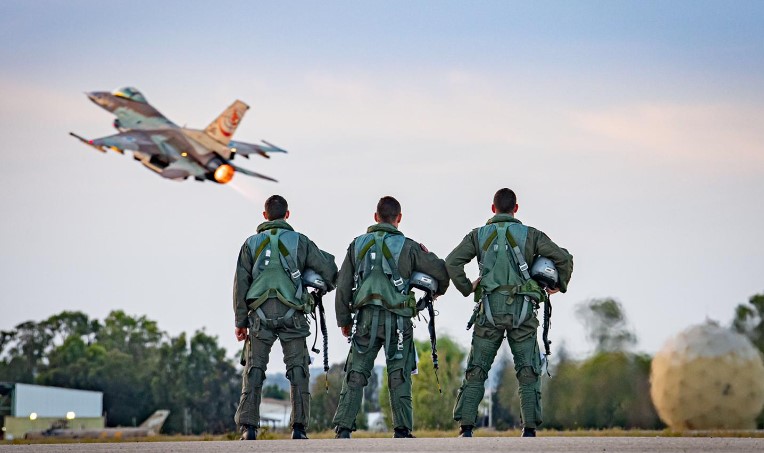An IDF fighter pilot spoke to The Telegraph about his experience defending Israel from the unprecedented Iranian attack overnight Motzei Shabbos.
“Major G” said that thwarting the over 350 missiles and drones was “the most complex mission of my life.”
“It really was a different thing with hundreds of those UAVs and missiles in the air getting intercepted around you, like Top Gun meets Star Wars, endless explosions and interceptions going on around you,” he said.
“It was the most complicated mission I’ve done in 20 years in the Air Force, knowing that if there is a missed target, maybe it blows up in Israel.”
“We flew in an amazing coalition with the US, UK and other forces and on the one hand it was a very aggressive attack coordinated by Iran, one which maybe we haven’t seen in modern warfare, but you’re seeing absolute defense in action.”
Although Major G is well-trained for night missions and has flown for over 3,000 hours, searching for low-flying cruise missiles is a very dangerous mission for pilots.
“It’s always harder to find and take down these targets in the night. They’re flying really low and so you fly low too but you’re unable to see the ground,” he said.
“You rely on sensors, but at some points it’s really close. You’re seeing street lights or other things on the ground very close to you and it’s a very uncomfortable feeling. But we’re well trained for that and we’ve proven this time that we know how to get the job done.”
Major G, who is a lawyer by profession, said that he was home with his wife and children when he was called.
“They are already familiar with the situation when you get the call and grab the bag that’s always ready in the closet and you leave at a moment’s notice. It happens every now and then, but nothing as extreme as last Saturday.”
But Major G. was back in his office by 4 p.m. on Sunday “shooting off emails” instead of missiles. “I took a shower, went to sleep for a few hours, woke up, had a great breakfast, and went back to work,” he said.
“It’s a complicated transition but you learn how to do it as you go by. One minute you’re shooting down drones somewhere in the Middle East, risking your life, barely making it, with this huge responsibility on missions important for the entire country and people, then you go back to your day-to-day chores, you get the kids ready for school, take them to daycare, people harass you at work with their tasks which are important, but you have to get used to that diving in and out of that operational world.”
He added that he has carried out many aerial missions since October 7th [in Gaza] but none were as significant or as dangerous as this one.
“Here it was a whole battlefield, you see the ballistic missiles in the sky getting blown up, the fireballs as a target gets blown up, you’re flying low altitude at night, then when you fire your own missile blowing up that target right on your nose, that’s a pretty incredible frame to look at.”
“It’s dark so you can’t see a lot but it’s in your radar lock. It’s very noisy as the missile flies out and you see it burn in the sky. It takes a second and a half until it hits and it’s like slow motion and you focus on making sure it hits the target. You see a huge fireball and you try to sidestep it so you don’t hit it.”
He said this mission was about being the “hunters”. “It’s not the situation where you get fired at as well which we’ve also dealt with. The main risk wasn’t losing the planes but missing the targets and having that hit in Tel Aviv or Jerusalem, or another strategic target in Israel. There is no second chance. We couldn’t say for sure we’d get all of them but happily we did.”
The results “exceeded expectations,” he said. “Intercepting cruise missiles or UAVs flying at low altitude at night is probably one of the most challenging missions you can try to accomplish.”
“It requires finding them which is very challenging but getting into position is very hard, without hitting the ground, hitting other planes, without risking your own plane. I’m not sure other air forces could’ve performed that. You’re really taking yourself to the edge.”
“I came back home early in the morning Sunday and typically you can’t talk about what you’ve done but this was all over the news and I saw the pride in my wife’s eyes. She felt safer than the night before so knowing you make a difference in people’s lives and make them safer in their own homes is the reason we do this.”
It could have ended very differently. “These missiles and UAVs, ballistics, flying into Israel were meant to come here. Some had half a ton of explosives. You could see where they were headed and how they were travelling. These weren’t aiming to hit outside the border.”
Below is a video of an interview with another IDF fighter pilot who also downed Iranian missiles in the unprecedented attack:
(YWN Israel Desk – Jerusalem)












One Response
Where is his gratitude to HKBH? ALL כפירה – . כחי ועוצם ידי
There were loads of Nissim that night: As he explained; it was the most challenging mission he ever had –
Nissim they managed to hit almost every target
Nissim no collision or accident
Nissim none of the debris hit an airplane
Nissim the various Jew hating Arab countries cooperated
Nissim Iran informed those countries in advance, so the whole mission could be prepared
IF WE DON’T THANK HASHEM FOR THE חסדים…. ה’ ישמור